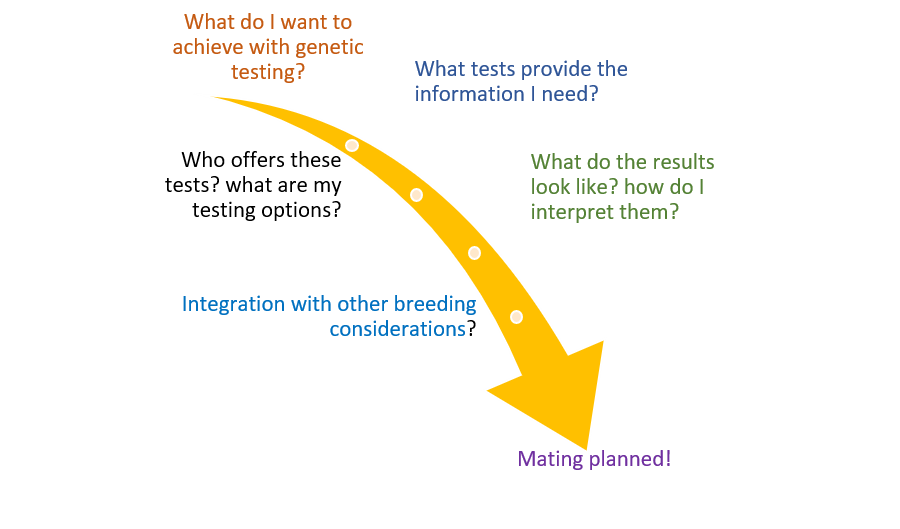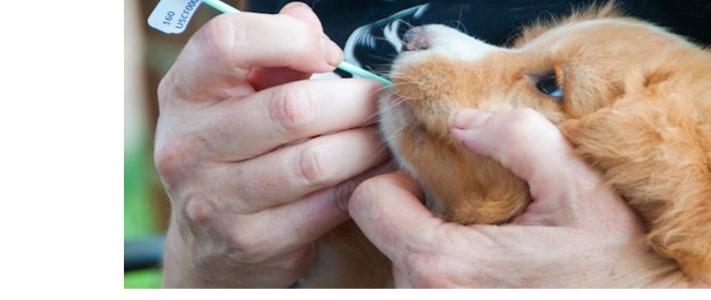Is COVID-time the Right Time to Kon Mari Your Genetic Testing Plans?
Is COVID-time the Right Time to Kon Mari Your Genetic Testing Plans?
a blog by Aimee Llewellyn-Zaidi, MSc; Project Director of the IPFD Harmonization of Genetic Testing for Dogs (HGTD) initiative.
“People around the world have been drawn to this philosophy not only due to its effectiveness, but also because it places great importance on being mindful, introspective and forward-looking.” -Marie Kondo, Founder of the Kon Mari method.
If you’ve already, like so many of us, used the Kon Mari de-cluttering method of “sparking joy” and being “mindful, introspective, and forward-looking” in cleaning out your garage, re-organizing your closets, and finally hanging those shelves, then it is no surprise you might be feeling like your breeding plans could do with a little refresh and reorganize. Sometimes in life, it is really valuable to assess our habits and old ways to see if they still “spark joy” or in this case, are still working effectively to achieve breeding goals. With many breeder organizations encouraging caution when planning litters, or recommending delaying mating plans, (click here) this could be the perfect time to reflect on dog breeding, and be mindful, introspective, and forward-looking with genetic testing!
Being Mindful:
Identifying what you want to achieve with genetic testing is critical in ensuring that the tests you use are fit for your purpose, and that you are making informed breeding decisions. There are a number of potential goals: confirming a litter’s parentage, using disease/trait test results to guide breeding plans to reduce risks or promote desirable characteristics, or providing a genetic permanent identification for your breeding dogs or puppies.

Genetic tests fall into a few different types. For breeders, you might mainly be interested in parentage testing (providing confirmation of a puppy’s parents), permanent identification (a panel of markers that provide a unique genetic “fingerprint” that cannot be removed), and disease/trait tests (individual tests, or packages of tests that give risk or inheritance information on a wide-variety of inherited diseases and traits, such as coat type or color.) There are also genetic tests that are diagnostic or used to assess clinical risks, and increasingly, tests that investigate breed diversity or breed determination. What types of tests you use is determined by what your goals are – it is easy to confuse testing options, and you don’t want to order a parentage test thinking you’re getting a permanent ID, or health information. If you have a number of goals, many genetic test providers offer packages of tests, or reduced costs when purchasing multiple tests and test-types.
When choosing disease or trait tests for your breed, you can start by searching the breed-specific tests listed on HGTD. The HGTD project has recently launched Breed Relevance Ratings (BRR) as a guide to what research and evidence (or not) supports available breed-specific tests. BRR uses a “traffic light” system to indicate what we currently know about a specific test for a specific breed. You can use this information in a number of ways, but it is useful when assessing how well-understood a specific disease test might be in your breed. These ratings are dynamic, and will change over time as more information becomes available. As HGTD also provides information on each disease/trait test, you can see the original research for many tests, and use this in conjunction with any information from your test providers to better interpret and understand test results. This is especially valuable when balancing a number of different test results in your dogs, with other breeding considerations. As more breed-specific tests become available, more dogs will of course have a variety low/medium and high-risk results. There is no such thing as a genetically “perfect” dog!
We have recently heard from a number of kennel clubs who are either already starting to incorporate parentage testing and genetic permanent identification into their databases, or making plans for this in the future. It can be really reassuring to both breeders and pet homes to have genetic confirmation of parentage – and if you have a genetic permanent identification, it can’t get “lost”, be removed, or be changed. When choosing a parentage or ID test, look for ISAG accreditation to ensure that your test results are interpretable internationally. The ISAG panel used by many GTPs is considered a “gold standard.” They have recently released a new ISAG 2020 panel for SNP (single-nucleotide polymorphism) testing, in addition to the 2004, and 2006 STR (short-tandem repeat/microsatellite) panels. Once you’ve decided on your goals, and what test(s) you might want to achieve them, who is your best test provider? The Search by GTP/Lab option lets you review test providers, including what tests they offer, any accreditation, and special expertise they have. Many genetic test providers are able to perform and provide test results completely remotely and only require you to use a home kit to test your dogs.
 Keep in mind that during the COVID-19 pandemic that any tests that require a blood sample, or being sampled by a veterinary professional may not be recommended at this time. Other considerations for choosing a test provider might be which GTPs are “accepted” by your kennel club, what reports look like and any after-care, and what types of tests are offered. (click here) Genetic test providers are increasingly offering breed-specific “panel” tests, which can be really cost effective. It is worth checking to ensure the panel they are offering includes all the tests you’re interested in, or be ready to buy additional tests. In addition, it is recommended that if you are using a panel test, you take your time when reading breed-specific reports. Some panel test providers like to provide all results, irrespective if the test is yet known to be breed-relevant, and others prefer to report only results that are known or suspected to be relevant. Responsible genetic test providers have clear risk information in their reports, whichever style they use. There is a risk that making breeding decisions based on results from irrelevant tests (e.g. where the mutation in your breed has no known correlation with disease risk) could lead to an unnecessary reduction in genetic diversity, false-confidence in disease risk reduction, or welfare issues if a dog’s results are mis-interpreted as a diagnosis for a disease they will never have symptoms of.
Keep in mind that during the COVID-19 pandemic that any tests that require a blood sample, or being sampled by a veterinary professional may not be recommended at this time. Other considerations for choosing a test provider might be which GTPs are “accepted” by your kennel club, what reports look like and any after-care, and what types of tests are offered. (click here) Genetic test providers are increasingly offering breed-specific “panel” tests, which can be really cost effective. It is worth checking to ensure the panel they are offering includes all the tests you’re interested in, or be ready to buy additional tests. In addition, it is recommended that if you are using a panel test, you take your time when reading breed-specific reports. Some panel test providers like to provide all results, irrespective if the test is yet known to be breed-relevant, and others prefer to report only results that are known or suspected to be relevant. Responsible genetic test providers have clear risk information in their reports, whichever style they use. There is a risk that making breeding decisions based on results from irrelevant tests (e.g. where the mutation in your breed has no known correlation with disease risk) could lead to an unnecessary reduction in genetic diversity, false-confidence in disease risk reduction, or welfare issues if a dog’s results are mis-interpreted as a diagnosis for a disease they will never have symptoms of.
Introspective/Self-reflective: what to do when you get your test results?
 Unless you are only interested in parentage or permanent ID, you will almost certainly have more than one genetic disease/trait result to consider in your breeding plans. You will also have other aims outside of genetic testing such as conformation, behavior, and clinical test results, as well as, perhaps the health and longevity of dogs related to the breeding pair. There are many resources that can provide a wide-variety of breeding advice for your breed. (click here) It can be helpful to divide the genetic test information on the dam and sire into a number of categories – what test results do I have? Which are high, medium or low risk? Any that are no risk at all? And, with what I know about the disease test results, how important are they to the health and welfare of my dogs when balanced against other concerns in my breed? Part of what makes genetic tests such a valuable tool, is that you are able to make fairly confident decisions when it comes to paring dogs to reduce or eliminate disease risk, i.e. it may be strongest for rejecting certain pairings. In other words, after eliminating certain potential mates due to genetic incompatibility, you can go on to look at the pros/cons, benefits and risks of the options remaining. Even if genetic testing offers some solid information, do not get lulled into making false assumptions about the over-all suitability of mating pairs or the health of a dog or its progeny (see: Health tested does not mean healthy). Genetic testing is a core breeding tool, but breeders must not get complacent or allow the popularity, simplicity and ‘high science’ of using ‘DNA’ results to distract them from tackling the greater challenges of informed breeding decisions, e.g. prioritizing health, conformation or behavioral traits that don’t come with genetic tests. No one analytic tool or test can replace the broad knowledge and experience that is needed in order to adequately consider the big picture for breeding decisions. Take time to reflect back to your original goals, with your gained insight into the tests and results…“I want to eliminate this mutation from my breeding plans, but doing it slowly will be better for my breed as a whole” vs “this is a really rare disease with high welfare-impact, so trying to get it out of the breeding population quickly is important” vs “I have 20 important considerations, and this genetic test is only one of them.” This is a really useful way to keep your eye on the end-goals, use genetic tests to help hone your breeding plans, and focus your energy.
Unless you are only interested in parentage or permanent ID, you will almost certainly have more than one genetic disease/trait result to consider in your breeding plans. You will also have other aims outside of genetic testing such as conformation, behavior, and clinical test results, as well as, perhaps the health and longevity of dogs related to the breeding pair. There are many resources that can provide a wide-variety of breeding advice for your breed. (click here) It can be helpful to divide the genetic test information on the dam and sire into a number of categories – what test results do I have? Which are high, medium or low risk? Any that are no risk at all? And, with what I know about the disease test results, how important are they to the health and welfare of my dogs when balanced against other concerns in my breed? Part of what makes genetic tests such a valuable tool, is that you are able to make fairly confident decisions when it comes to paring dogs to reduce or eliminate disease risk, i.e. it may be strongest for rejecting certain pairings. In other words, after eliminating certain potential mates due to genetic incompatibility, you can go on to look at the pros/cons, benefits and risks of the options remaining. Even if genetic testing offers some solid information, do not get lulled into making false assumptions about the over-all suitability of mating pairs or the health of a dog or its progeny (see: Health tested does not mean healthy). Genetic testing is a core breeding tool, but breeders must not get complacent or allow the popularity, simplicity and ‘high science’ of using ‘DNA’ results to distract them from tackling the greater challenges of informed breeding decisions, e.g. prioritizing health, conformation or behavioral traits that don’t come with genetic tests. No one analytic tool or test can replace the broad knowledge and experience that is needed in order to adequately consider the big picture for breeding decisions. Take time to reflect back to your original goals, with your gained insight into the tests and results…“I want to eliminate this mutation from my breeding plans, but doing it slowly will be better for my breed as a whole” vs “this is a really rare disease with high welfare-impact, so trying to get it out of the breeding population quickly is important” vs “I have 20 important considerations, and this genetic test is only one of them.” This is a really useful way to keep your eye on the end-goals, use genetic tests to help hone your breeding plans, and focus your energy.
Forward looking
Genetic testing technology, including what tests are available and advances in interpretation and advice (as well as confusion!) are only going to increase over time. Most kennel and breed clubs are already including genetic test results in breed records to some extent , and as the genetic technology advances and becomes more accessible, the future is likely to include genetic testing as standard practice, especially when it comes to registration – with parentage testing, and/or health testing regulations. Being informed now will help you to be prepared for the future, and improve your breeding plans moving forward. As a final note, a key part of the Kon Mari method of organizing includes the concept of “thank you, and good bye.” This philosophy allows you to reflect on what worked in the past, be okay with it, and also say good bye to move onto better things for your future. This is the same in dog breeding – you might have tried something in the past that doesn’t work now, or you might have had something that worked okay but could be better. Or you may have old habits and attitudes that could be dropped. Say goodbye, and move on. Learn the lessons from the past experiences, but only take with you when moving into the future, what is right for you and your breeding strategies now and moving forward.
References:
Kondo, Marie. The Life-Changing Magic of Tidying Up: The Japanese Art of Decluttering and Organizing
 Donate
Donate
1 Comment
Recommended Comments